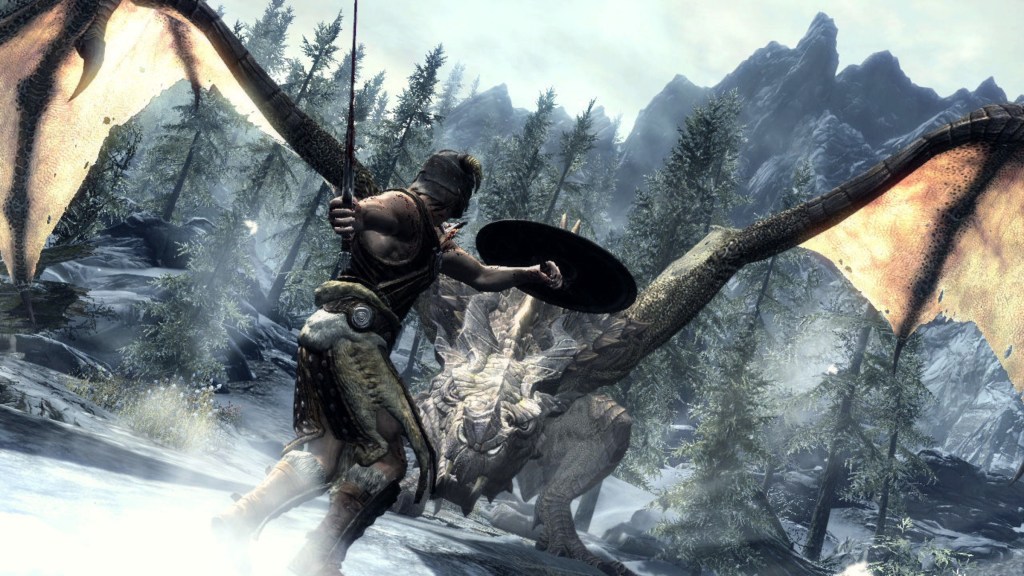For nearly two decades, The Elder Scrolls series has defined what open-world fantasy RPGs could be, to the point where it needs to cross into different media. From Morrowind’s alien landscapes to Oblivion’s radiant AI and Skyrim’s sweeping Nordic vistas, Bethesda Game Studios built worlds that rewired the genre and reshaped player expectations forever. And yet, ten years after Skyrim, fans are still waiting on The Elder Scrolls VI. It has grown into something more than a game, but rather a cultural event waiting to happen and sweep the gaming industry like Skyrim did on November 11th, 2011.
Videos by ComicBook.com
But every year that passes transforms the anticipation into something more dangerous: growing expectations. Fans want a game bigger than Skyrim, deeper than Morrowind, more reactive than Baldur’s Gate 3, and more technically impressive than any open world ever built. And after the long, messy history of Fallout 4, Fallout 76, and most recently Starfield, it’s hard not to ask the uncomfortable question: Can Bethesda still deliver the magic we’re waiting for? Speaking personally, after 20 years of following this studio, I’m not convinced.
The Elder Scrolls VI Has Impossible Expectations

Let’s get something out of the way early: The Elder Scrolls VI could launch as a polished, content-rich, world-shaping RPG, and it still wouldn’t satisfy everyone. Not because the game will be bad, but because the expectations are simply impossible. Skyrim wasn’t just successful when it launched in 2011; it was a phenomenon. It took over the gaming industry and remains affluent today, with mods still being produced, countless rereleases, and has become a mainstream meme producer. It turned dragons, shouts, and knee-related injuries into household references. It sold over 60 million copies across a decade and every platform under the sun. For many players, Skyrim is the definitive open-world RPG that so many others have tried to imitate.
But that’s the first problem. Skyrim wasn’t flawless; in fact, it had many flaws and still does to this day. It stripped away deep spellcrafting, removed attributes, simplified factions, gutted dialogue choices, and leaned more heavily into accessibility and power fantasy than any Elder Scrolls before it. As someone who loved Oblivion, I wondered what happened after my first playthrough of Skyrim. I, along with many long-time fans, still believe Oblivion and even Morrowind offered more depth. But because Skyrim became a global hit, its legacy has become a myth. Players remember the peaks, not the compromises.
Following this seems impossible, but that is the task set before Bethesda with The Elder Scrolls VI. Add the fact that Bethesda announced The Elder Scrolls VI way too early, and you get a decade of fan-driven hype. Without trailers, screenshots, or any real details from Bethesda, the community has invented its own ideal version of the game. Some expect next-gen AI with dynamic societies. Others expect a map larger than Starfield’s entire galaxy. Some want a return to Morrowind-style weirdness, while others want Skyrim 2.0 with modern tech.
There is no way Bethesda can satisfy all of these expectations. The remake of Oblivion showed the power of early Bethesda and why so many still love the Xbox 360 classic to this day. For The Elder Scrolls VI to succeed, it needs to go above and beyond, to truly reshape open-world fantasy games like its predecessor did, but do even better. And as much as I want The Elder Scrolls VI to succeed, I just don’t know if Bethesda still has it.
The Bethesda We Loved Is Long Gone

This is the part Elder Scrolls fans don’t like hearing, but it’s important we say it out loud: Bethesda Game Studios today is not the same studio that released Morrowind, Oblivion, Skyrim, or even Fallout 3. That’s not an insult. Studios evolve. People leave. Priorities shift. Technology changes. But it does mean fans have to change expectations. The Elder Scrolls VI would prove an arduous task for Bethesda at its peak, but looking at the last fifteen years of the studio’s major releases, especially the most recent, I just don’t see the trajectory of a studio at the height of its creative power.
Fallout 3 was a major shift from the previous games, and while it remains my favorite in the series, it was a buggy mess. Skyrim didn’t fare much better in the bug department, plus it was a simplified version compared to previous entries in the series. Fallout 4 massively stripped away the role-playing aspects with its downgraded dialogue options. Fallout 76 was a broken mess at launch due to bugs, unfinished gameplay, and a directionless feeling. And then there is Starfield.
Starfield was billed as Bethesda’s next revolution, a major hit that would satisfy the demand for “Skyrim in space,” but even that failed to meet expectations. And for me, this is the clearest warning sign. After eight years of development, it was released as a buggy title that felt like an old design dressed up in new tech. It felt old-school and not in a way that I liked. The gameplay mechanics were ambitious, but felt safe and shallow. The writing was some of the worst Bethesda has produced, and the world just didn’t feel interesting. Add to that the procedural aspects that made the game feel repetitive, and somehow, Bethesda’s dream project has only left me more nervous for The Elder Scrolls VI.
The design philosophy that created the most beloved Elder Scrolls games: emergent worldbuilding, deep simulation, and maximalist experimentation, has gradually faded from the studio’s DNA. Modern Bethesda prioritizes approachability, streamlined systems, and cinematic presentation. While there’s nothing wrong with that, many players prefer it, but it just doesn’t leave me hopeful for The Elder Scrolls VI. I want a triumphant return of Bethesda’s iconic gameplay, but adapted and evolved for modern times. But I recognize Bethesda is no longer the studio I loved, and I’ve lowered my expectations.
Skyrim’s Successor Will Be Good, and That’s Okay

I remember the first time I played Skyrim. My friends and I had gone to GameStop’s midnight release, and the store let us in early. Somehow, I was the first to play the game in the store before midnight. I ran through the exhilarating opening and emerged into the open world. It was breathtaking. I ran down the mountain and saw my first mammoth, and at the encouragement of the crowd behind me, ran up and punched it right in the butt. That was when I discovered how strong giants were, as it sent me ragdoll flying across the map. As I passed the controller to the next player, that was when I fell in love with Skyrim.
As I continued playing Skyrim, I deeply enjoyed myself, but it never captured the same magic that Oblivion did for me. In the end, when I set The Elder Scrolls V aside, I was left with the feeling that the game was good, but not as great as those that came before it. Looking back, this has shaped my expectations for The Elder Scrolls VI. I don’t think it will be a bad game; in fact, I think it will probably be a very good game. I just don’t believe it will be a great game.
It may be great in several areas: visuals, audio, world scale, cultural detail, environmental storytelling, combat fluidity, and open-ended exploration. Bethesda understands how to capture the sensation of stepping into a beautiful world and getting lost for hours. They’ve always excelled at that. But it likely won’t be the monumental, genre-shattering masterpiece the community is longing for. The Elder Scrolls VI will be a solid RPG that doesn’t reinvent the industry or revolutionize open-world games. And that’s okay.
We have to stop expecting Bethesda to deliver the kind of innovation they were capable of when the open-world genre was still young. The landscape has changed. Baldur’s Gate 3 has changed expectations for narrative. Elden Ring has changed expectations for open worlds. CD Projekt, FromSoftware, Larian, Nintendo, and even indie studios have raised the bar. Bethesda’s strength has never been perfection: it has been atmosphere, freedom, and a sense of place.
I fully expect Bethesda to deliver a world that feels alive, mysterious, and worth exploring. The Elder Scrolls VI will succeed, maybe not as a torch-bearer of RPG progress, but as a strong, memorable adventure. As much as I want the game to top Morrowind, Oblivion, and Skyrim, I am okay with it being a new world with new stories, even if it doesn’t redefine gaming. As someone who grew up with Morrowind and Oblivion, spent hundreds of hours tinkering with Skyrim mods, and watched the painful decline of Bethesda’s design magic, maybe The Elder Scrolls VI isn’t for me anymore. But I hope the fan base doesn’t set itself up too much for perfection, because there is almost no chance Bethesda can deliver this, at least, not anymore.
What do you think? Leave a comment below and join the conversation now in the ComicBook Forum!









